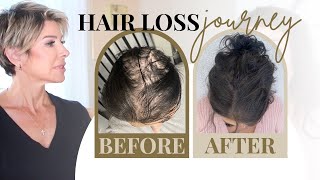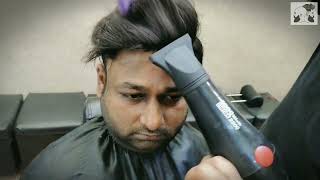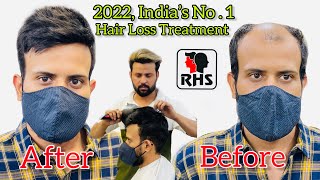Does Smoking Causes Hair Loss?
- Posted on 29 August, 2021
- Hot Topic
- By SNY Admin
We know that smoking tobacco is the possible cause of heart disease, lung cancer, and respiratory illness of many smokers. But does smoking has a clear connection to hair loss or maybe, contributing factors? What can researchers and experts tell us about that?
If your having this issue of hair loss regardless of the cause and thinking of an SMP procedure would remedy your problem.
Impact of smoking on your hair
While lack of nutrients can cause hair loss, such as iron deficiency. Cigarette smoking is thought to cause hair loss in several ways. We’re here to talk you through the impact that smoking can have on your hair health and hair loss. Smoking can damage hair from a variety of different angles.
Reduced Blood Circulation
Reducing blood flow to your scalp and reduced blood circulation around the body can mean the hair and hair follicles aren’t getting the oxygen and nutrients they need to grow healthily. Nicotine gum can block blood circulation and cause hair damage in the form of premature balding, and we all know that balding is not reversible.
The hair growth cycle is interrupted when your follicles don’t receive the blood they need for nourishment. The cycle of hair growth consists of four phases: the growing phase of the hair (anagen phase), the transitional (catagen) phase, the resting (telogen) phase, and the shedding (exogen) phase. As your hair follicles fail to receive the necessary nutrients from blood, your hair growth cycle is disturbed. Any interruptions to this cycle can lead to noticeable hair loss.
The increased levels of cytokines changing enzyme levels that control tissue remodeling in your hair growth cycle, increasing hydroxylation of the hormone estradiol, and inhibition of the enzyme aromatase leads to a state of low estrogen levels.
Damages DNA
Smoking damages DNA, affecting the hair follicles – damaging the hair at the root and the hair growth cycle.
In an older 2003 study, researchers proposed that toxins present in tobacco smoke may lead to damage in the DNA of cells in your hair follicles. Damage to the DNA of these cells may potentially lead to impaired hair growth.
Nicotine is known to cause constriction of dermal hair papilla and local ischemia, accumulation of DNA damage, dysregulation of protease/antiprotease systems involved in the hair growth cycle, and upregulation of local pro-inflammatory cytokines implicated in follicular inflammation and fibrosis.
At this time, the health effects of vaping are still widely unknown. Vaping products are still relatively new on the market, and researchers are still trying to figure out all its effects on your body. A 2018 report found significant evidence that vaping could cause oxidative stress and damage to DNA.
A Weakened Immune System
Cigarette smoking can damage your immune system, leading to diseases or illnesses that cause hair loss. A poor immune system may also increase your chances of a bacterial or fungal infection on the scalp, both of which can prevent your follicles from producing healthy hair.
Cigarette smoke may affect the immune system by being pro-inflammatory and immunosuppressive, taking these roles seriously.
A 2020 study compared the prevalence of early-onset androgenetic alopecia in male smokers and nonsmokers between 20 to 35 years old.
Environmental Pollution
Each time you smoke, a cloud of fumes surrounds your hair; this can be soaked up by the hair, causing damage and giving hair a smokey smell. If you regularly smoke at home or in a car with the windows rolled up, you could be creating environmental pollution.
External exposure to nicotine can cause severe damage to the hair follicles and make hair follicles fall out. The harmful chemicals that are released from nicotine can cause diseases of the hair which stops growth. Ambient tobacco smoke exposure results in nicotine accumulation in hair follicles and the hair shaft.
Nicotine is also shown to reduce the blood pressure across the scalp and damage the blood vessels causing clots in hair which is one of the major reasons for nicotine hair loss and discontinued hair to grow. If consumed in excessive amount may lead to hair loss, because as we all know, excess of anything is bad.
Polluted air can exacerbate genetic hair loss, and the carcinogens in smoke-filled air can obstruct the mechanisms that produce the protein of which hair is made. Genetic factors play an important role in alopecia and PHG; environmental factors, including smoking and nicotine exposure, should be considered. While most hair loss is genetic, research links thinning hair to environmental factors.
Poor Blood Circulation
Smoking increases the risk of developing conditions that cause poor circulation. It also interferes with blood flow, damages the walls of blood vessels, and causes plaque to build up in veins. These effects increase the risk of cardiovascular disease, strokes, and heart attacks.
Smoking causes arteriosclerosis – a build-up of fatty deposits in the vessels and loss of elasticity of the vessel walls. If the blood cannot flow freely through the vessels, it can block and lead to partial or total loss of circulation, which could ultimately result in sores, ulceration, gangrene, and amputation.
Hair follicles need oxygen, nutrients, and minerals to produce healthy hair—impaired blood flow to the hair follicle. Smoking affects circulation because the toxic chemicals in cigarettes make the blood vessels shrink, restricting blood flow and increasing your body’s free radicals production.
Hair bulbs exposed to oxidative stress tend to be increasingly vacuolated. This causes increased reactive oxygen species and oxidative stress around the follicle, leading to damage to melanocytes and decreased melanin production and potentially speed up the aging of your hair and lead to dryness at a younger age.
Smoking and Premature Hair Graying
Scientists have long speculated cigarette smoke may lead to hair loss and premature graying. The toxins in smoke can damage hair follicles and the hormones in the body. These changes can cause early greying or lightening of the hair.
A 2013 study found significant evidence that there’s a relationship between the onset of gray hair before turning 30 years old and smoking cigarettes. Subjects in observational research, exposed to smoking tobacco, chewing tobacco, or a combination of the two, had a higher incidence of premature graying.
Korean patients ages 12-91 years reported a 14.9% increased risk of developing premature gray hair for every year a subject smokes and an overall 1.99 times higher risk of graying prematurely than nonsmokers. After controlling for variables, the researchers found a “significant” and “consistent” link between smoking and early graying.
Will my hair grow back if I stop smoking?
The best way to reverse the effects of smoking on hair is by quitting smoking. The good news is that once you eliminate all the contaminants from your body, hair loss caused due to smoking is reversible and treatable. Once you quit, scalp hair grows back, as your body starts to heal and function normally.
Stopping smoking will help your hair health and help restore the natural healthy growth cycle. With increased blood flow to the hair follicles and nutrients, hair is thicker and more hydrated. The hair loss can at least be reversed if nicotine is quit since nicotine is mostly used in the form of tobacco gum, cigarettes, e-cigarettes, vapes, etc.
The toxins in cigarette smoke can impact the levels of estrogen in women. This can result in thinning hair. Giving up the habit is likely to see your hair grow back stronger and thicker.
SMP for Hair Regrowth
How to treat smoking-related hair loss. Smoking may lead to major forms of hair loss like androgenetic alopecia and alopecia areata. To help manage its effects, quitting smoking may be a great place to start. Countering smoking on hair loss can be achieved through hair growth therapies like minoxidil, finasteride, and corticosteroids. Treating it is hard, but to remedy it is easier.
Scalp Micropigmentation or SMP mimics the short hairs of a closely shaved scalp. Just like a hair transplant procedure, scalp micropigmentation requires knowledge, innate artistic passion, and a highly experienced tattooist or micropigmentation provider to generate excellent cosmetic outcomes.
However, SMP will neither promote nor hinder hair growth or hair loss; it simply adds micro tattoos that replicate the look of thicker, denser-looking hair.
The Bottom Line
We’re all more than aware of the increased risk of certain cancers, strokes, heart disease, and respiratory illness in smokers. But not the risk of hair loss due to smoking.
Both men and women tend to develop thinner hair as they age, and smoking can accelerate this process. Some studies even suggest people who smoke are more likely to go bald.
A smoking habit may even lead to the early appearance of wrinkles, fine lines, and sagging skin. Besides being the single most preventable cause of significant morbidity and an important cause of death in the general population, tobacco smoking has been associated with adverse effects on the skin. Smoke-induced premature skin aging has attracted the medical community’s attention, while only recently an observational study has indicated a significant relationship between smoking and baldness.
However, The damage is reversible to only an extent. So keep in mind these points to prevent any permanent damage to your hair or your body, and maintain a healthy and smoke-free lifestyle. It is advisable to get rid of your smoking habits as soon as possible. It’s never too late to start living healthy!




